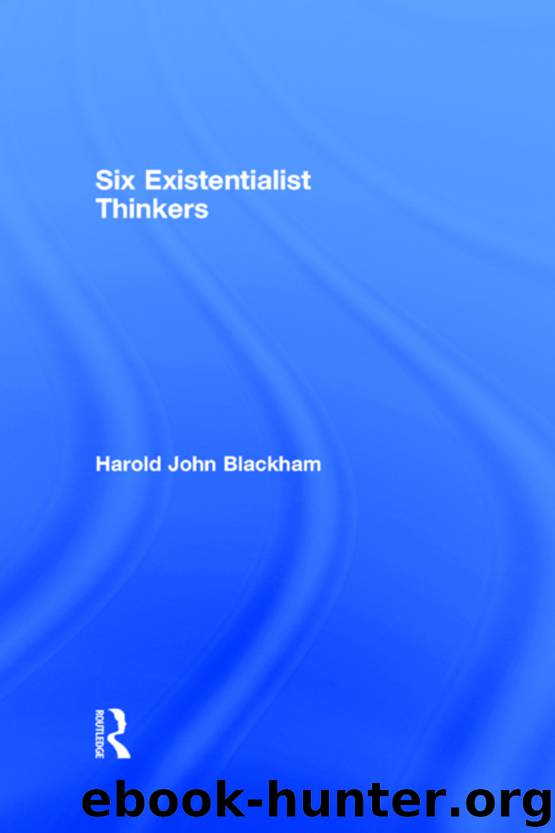Six Existentialist Thinkers by Blackham Harold John;

Author:Blackham, Harold John;
Language: eng
Format: epub
Publisher: Taylor and Francis
II
Has Heidegger in the published first part of Sein und Zeit on which the foregoing exposition has been based dug away the ground on which he proposed to construct a metaphysic of Being? His description shows the intelligible world of meanings constituted by the structure of personal existence upon the given actuality of brute existence. These meanings answer the questions what, what for, how, as, but actuality remains impenetrable to the probe of why, as does personal existence itself. Man constitutes meanings but not natures. Therefore there seems to be no possibility of answering the question, why is what is? of finding a ground of necessity for all existence, which was the early enterprise of metaphysics in raising the question of Being. Sein and Zeit shows man in the midst of all beings in the whole, a situation which both gives rise to and excludes the possibility of metaphysics, since our standing off from things (including ourselves) raises the question and yet our standpoint remains within the whole and excludes in principle an absolute comprehension.
Nevertheless, Sein and Zeit as published is only the first part of what Heidegger intended to say, and it has to be interpreted, and indeed revised, in the light of what he has published since. This effaces many of the impressions which that work taken by itself is bound to make. His philosophy takes shape as the historical quest for Being, and is seen to be essentially religious. It no longer looks like a fixed heroic gesture of man permanently caught in the despair of nihilism, and it loses its sensationally dramatic form. True, God is dead, as Nietzsche put it, but the very lack of God is a revelation and a promise.
As Heidegger characteristically puts it in his interpretation of the poet Hölderlin, the time is a time of need because it lies under a double negation, the no-more of the gods that have fled and the not-yet of the god that is coming. The coming of the new god cannot be forced, and a return to any of the old gods is a futile attempt to live in the past. Heidegger seems to think of the self-revelation of Being as a historical development, demanding the appropriate approach and attitude in each phase. The present phase is post-theological and post-metaphysical: it is with the recognition that God is dead and that man has no standpoint outside the totality of things that man must approach again in this age the problem of Being.
Some of Heidegger’s later writings (the most important for understanding his thought) are oracular in tone and one can have no confidence in interpreting the cryptic sentences in which his thought is condensed. The attempt here is to present the spirit and orientation of his thought rather than the actual concepts.
To return to the central analysis of Sein und Zeit: transcending the primordial act of transcendence which founds the construction of the intelligible world is the act by which the person roused by conscience
Download
This site does not store any files on its server. We only index and link to content provided by other sites. Please contact the content providers to delete copyright contents if any and email us, we'll remove relevant links or contents immediately.
The remains of the day by Kazuo Ishiguro(7581)
Tools of Titans by Timothy Ferriss(6971)
The Black Swan by Nassim Nicholas Taleb(6208)
Inner Engineering: A Yogi's Guide to Joy by Sadhguru(5917)
Giovanni's Room by James Baldwin(5898)
The Way of Zen by Alan W. Watts(5813)
The Six Wives Of Henry VIII (WOMEN IN HISTORY) by Fraser Antonia(4801)
The Power of Now: A Guide to Spiritual Enlightenment by Eckhart Tolle(4777)
Astrophysics for People in a Hurry by Neil DeGrasse Tyson(4631)
Asking the Right Questions: A Guide to Critical Thinking by M. Neil Browne & Stuart M. Keeley(4606)
12 Rules for Life by Jordan B. Peterson(3755)
The Ethical Slut by Janet W. Hardy(3517)
Skin in the Game by Nassim Nicholas Taleb(3485)
Housekeeping by Marilynne Robinson(3424)
The Art of Happiness by The Dalai Lama(3393)
Double Down (Diary of a Wimpy Kid Book 11) by Jeff Kinney(3288)
Skin in the Game: Hidden Asymmetries in Daily Life by Nassim Nicholas Taleb(3276)
Walking by Henry David Thoreau(3240)
12 Rules for Life: An Antidote to Chaos by Jordan B. Peterson(3211)
